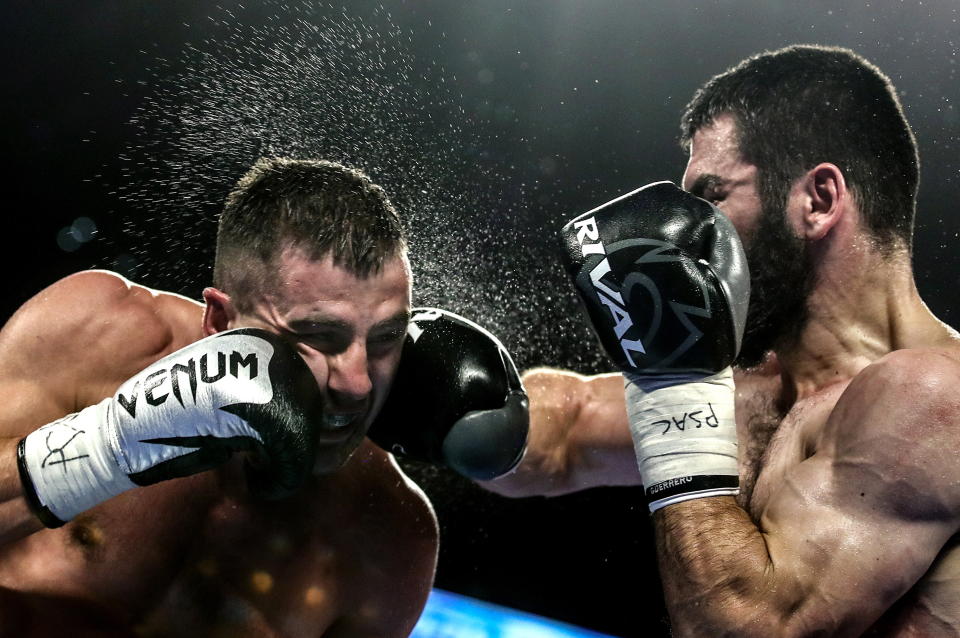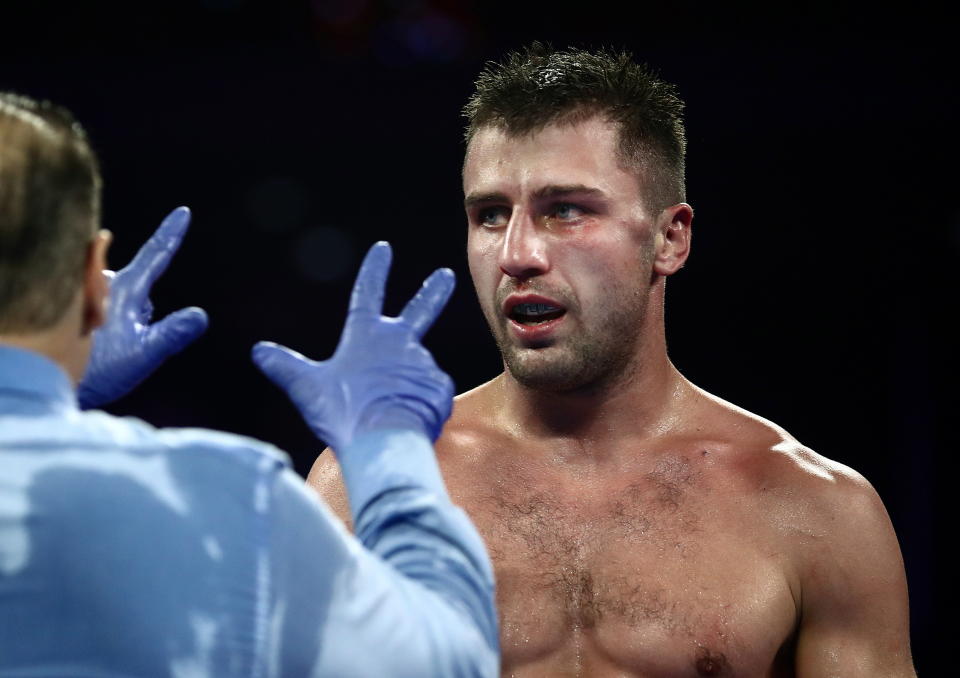The sad truth about 'quitting' in boxing ... and why Max Kellerman was wrong to say it
“Quitting” is a loaded word in boxing circles.
Maybe it’s fair to say that a boxer who took a bout because he needed a few extra bucks to pay for some work on his car and didn’t train all that hard might quit when he runs out of gas as the fight progresses because the payday is secure and the extra couple of rounds isn’t worth the bother to him.
But is it the same thing as saying that an undefeated world champion and an Olympic medalist who fought fiercely until he wilted under the pressure of a stronger, tougher and better opponent also quit?
Hardly.
That didn’t stop ESPN boxing analyst Max Kellerman from twice suggesting on Friday that Oleksandr Gvozdyk quit in his light heavyweight title unification bout in Philadelphia with unbeaten Artur Beterbiev.
Kellerman has a great passion for boxing as well as a deep and abiding respect for the fighters in it, but what he said was short-sighted, dangerous and just plain wrong.
ESPN’s Kellerman: ‘Gvozdyk quit in the corner’
When referee Gary Rosato stopped the bout after Beterbiev knocked Gvozdyk down three times in the 10th to become the IBF-WBC light heavyweight champion, Kellerman said, “Even as Beterbiev was giving the impression of an avalanche, I thought Gvozdyk was winning rounds. But like Andre Ward in his second fight with [Sergey] Kovalev, Beterbiev was winning the story of the fight. You could see it coming. ... Then eventually the avalanche came, and Gvozdyk quit in his corner, and [trainer] Teddy [Atlas] knew he quit. … [He] tried to talk him out of it, but he was done.”
After the fight, Kellerman said in an interview with FightHype, “Gvozdyk quit. Gvozdyk quit in the corner. Yeah, he quit in the corner.”
Kellerman’s intentions may have been the best, but his comments are wrong on so many levels. At the best, it was highly insensitive since his words came just two days after Patrick Day died as a result of injuries suffered in a fight in Chicago six days prior. And it was only 88 days since Maxim Dadashev died of injuries he suffered in a fight that Kellerman broadcast on ESPN.
But saying a fighter quit during a bout not only ignores the punishment that he has taken in the ring as the fight unfolds but also turns a blind eye to what happened in the gym when there were no TV cameras to record the moment for posterity.

So many fighters over the years have given their lives in the ring, not because they were battered during their bouts but because they suffered a subdural hematoma, which is a collection of blood under the skull and outside the brain. Some subdural hematomas clear up quickly on their own; in others, pressure builds on the brain and it can become fatal.
A lot of times, a fighter who has died had a subdural hematoma suffered in sparring that had begun to heal, but getting hit in the same spot in a fight causes it to bleed again and the pressure to rise.
Kellerman used the word avalanche to describe the pressure that Beterbiev was putting on Gvozdyk and how it was increasing during the fight.
Atlas responds to Kellerman’s comments
Gvozdyk’s trainer, Teddy Atlas, once was an ESPN analyst and he knows the power of words. He’s gotten into trouble more than once for speaking his mind on the air.
Atlas called Kellerman a friend and said he knows him to be a good and caring person. But he used Kellerman’s choice of words to demonstrate why he disagreed with Kellerman’s contention that Gvozdyk quit.
“If you’re under an avalanche of rocks, and you’re under that avalanche for 30 minutes, and finally they take their toll and they crash you to the ground,” Atlas said. “But you get up and they just crash you to the ground again. And you get up again. And then they crash you to the ground again, even harder.
“Did you quit? Did you give in to the rocks? Or were those rocks just a greater force than your body?”
Where Kellerman’s words become problematic is in the context of fighter safety. Nearly everyone who is a boxing fan loves it when two evenly matched, highly skilled fighters swap punches in a back-and-forth slugfest.
The problem is, we don’t know for certain what went on in the gym in the days before the fight. We aren’t sure whether one, or both, of the fighters has a subdural hematoma he brought into the bout with him.
It is always, no matter the stakes, no matter what championship is on the line or how much money awaits the winner, far better to stop a bout one punch too early rather than one punch too late.
Boxing needs more thoughtful, outspoken analysts like Kellerman. He has the right to his opinion, but he doesn’t know what is going on in a fighter’s mind and this is one of those cases where some things are best left unsaid.

Atlas pointed out there’s no way Kellerman can be sure he is correct.
“If Max, as I did, believes what he says is the truth, then so be it,” Atlas said. “So be it. But yes, you’ve got to think about it before it comes out of your mouth. You better believe it to be the truth and more importantly, you had better connect that truth to something that is tangible.
“I connected the things I said, whatever they were, to something I knew from having had 45 years of experience in this sport. All I will say in this case is, what did you connect this to? When you say something that is loaded in today’s game, you need to respect these fighters, and I know he does, and you need to respect this sport and that means you need to know it to be the truth. How do you know it to be the truth? That’s all I’m going to say.”
Gvozdyk didn’t quit; he fought bravely and like a champion against someone who on this night was simply better. The word “quit” has so many negative connotations in boxing that it is irresponsible to use it in the manner that Kellerman did.
Neither Maxim Dadashev nor Patrick Day quit, and look what it got them.
Maybe if they had, or someone had thought to stop the fight a round or two sooner, this entire conversation wouldn’t be so damn sad.
More from Yahoo Sports:


